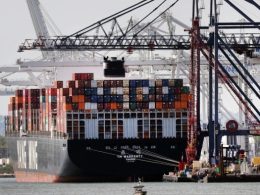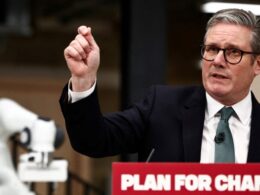Unlock the Editor’s Digest for free
Roula Khalaf, Editor of the FT, selects her favourite stories in this weekly newsletter.
The UN’s top trade official has urged the US to spare the world’s poorest countries from high tariffs, saying they will damage vulnerable economies without raising significant sums for the Treasury or shrinking the US trade deficit.
Rebeca Grynspan, secretary-general of the UN Conference on Trade and Development (Unctad), told the Financial Times that while some of the world’s least developed countries depended on exports to the US, the dollar amounts they shipped were too small to have much impact on the US trade gap.
“Take Madagascar,” she said, noting that it was one of the world’s poorest countries with GDP per capita of just $509. “If you try to calculate how much of the US trade deficit it represents, you will get zero, because you can’t even round it up to 0.1 per cent . . .
“It exports products which the US doesn’t produce. They are not competitors and they imposed a tariff of 47 per cent on it.”
The Trump administration’s so-called “reciprocal tariffs” on each country are proportional to the bilateral trade deficit divided by bilateral imports, a method that Grynspan said penalised the world’s poorest nations disproportionately without helping Washington.
“Our plea, our petition, is to reconsider,” she added. “It’s not that we are questioning what they are doing, it’s that [the measures on poorer countries] don’t have an impact on the objectives which the US has set out for its trade policy.”
The world’s 44 least developed countries, she said, contributed just 1.6 per cent of the US trade deficit, yet the effect of much higher tariffs would be “extremely serious” for their fragile economies, raising the risk of fresh debt crises. These could be worsened by higher global interest rates if borrowing costs were increased to combat inflation.
Poorer nations would struggle to make their case to the Trump administration for a tariff rethink because they had “no negotiating power”, she added. They would have to wait in line behind much more powerful nations with better access in Washington.
Global investment would also be hit by uncertainty created by the tariffs, Grynspan said. “It will paralyse investment until the situation is clearer. What we have heard from company CEOs is ‘sit and wait’.”
Over the longer term, economies in the global south would probably trade more with each other as a result of the US measures, the UN official said.
This would reinforce a trend in which trade between developing economies has risen to 30 per cent of total world trade, while the share between wealthy economies has halved from the last century to this one, according to Unctad figures.
Grynspan, a Costa Rican economist and former vice-president, supports what she calls “open regionalism”: the rise of regional trade blocs, such as Asean, that help national economies develop scale and resilience to sell globally, rather than walling themselves off from the world.
Looking ahead, she said intra-Asian trade would probably increase significantly and regional trade would be “vital” for Africa, too. “The countries of the south need trade,” she said.
Source link









